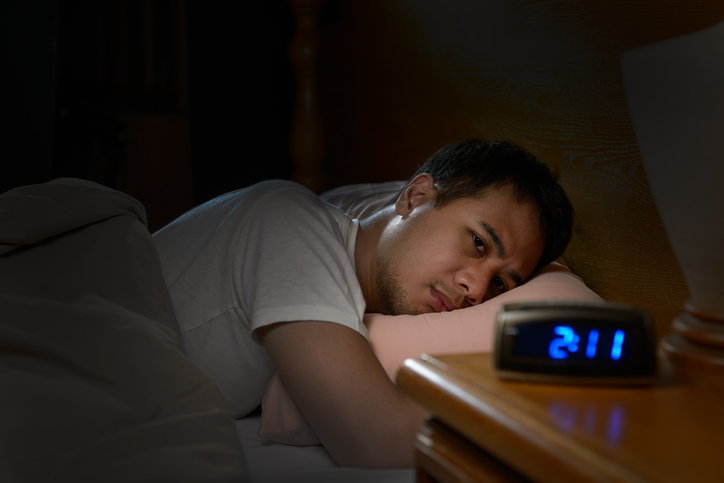By Drs Carla Edwards @Edwards10Carla and Meeta Singh @athletesleepmd1
Anxiety and Insomnia, respectively, are the most prevalent psychiatric and sleep disorders experienced by the general public, and anxiety and insomnia symptoms are highly prevalent among elite athletes. While each may exist without the other, they are often common partners. Additionally, they serve as risk factors for each other with anxiety increasing the risk of developing insomnia, and vice versa. This is an unhealthy partnership as the severity of one will mirror the severity of the other.
The relationship between insomnia and anxiety can be understood through the concepts of hyperarousal and a dysregulated stress response. Hyperarousal describes an overactive state of neurobiological and psychological systems, while the stress response encompasses cognitive, emotional and neurobiological reactions. Together they may function as a pathway by which the brain responds to repeated challenges with development of anxiety and insomnia symptoms.
As the relationship is bidirectional and complex, sport medicine physicians, psychiatrists, psychologists and sleep specialists should expect these two conditions to routinely present co-morbidly.
Impact of Covid-19
Of course, these are not routine times and the terms “anxiety” has been trending since COVID-19 swept across the globe and changed lives dramatically for us all, including the athletes we support. In routine times, anxiety in the sports world is often attributed to pressures related to performance and outcomes. During the current era of COVID-19, uncertainty associated with loss of training venues, access to training staff/teams, cancelled schedules and games, personal and family infection risks, and attempts to “recalibrate plans” with an extra year inserted before the Olympic/Paralympic Games is likely to result in elevated anxiety and insomnia in athletes (and support staff).
Both anxiety and insomnia lead to significant distress and dysfunction and can manifest as psychological or physical symptoms including:
- racing thoughts, excessive worry and feeling overwhelmed (these symptoms at night can lead to insomnia, which in turn results in irritability and impaired coping the next day),
- panic attacks
- trouble initiating sleep, maintaining sleep and non-refreshing sleep despite adequate opportunity to do so,
- poor concentration and forgetfulness,
- disorganization,
- irritability and anger with angry outbursts
- physical symptoms such as muscle tension and shortness of breath
These symptoms can be experienced in various combinations and may not fulfill the diagnostic criteria of a formal disorder. Despite that, they can still be serious and disabling.
Although the disruption caused by anxiety and insomnia deserve attention and management during ordinary times, the need for these challenges to be identified and addressed assume greater poignancy in the era of COVID-19.
Both anxiety and insomnia are associated with:
- impaired executive functioning, which contributes to a reduced ability to utilise effective coping strategies and filter negative thoughts.
- fatigue, which may result in decreased participation in social relationships and in pleasurable activities the next day.
- reduced participation in sports-related activity, compounding the stress that non-participation causes.
- general psychosocial distress that increases vulnerabilities for illness as part of the diatheses stress model.
Thus, it is important for sport medicine physicians, psychiatrists, sleep specialists and psychologists to rapidly identify anxiety and insomnia through the use of clinical interviews and screening questionnaires. Athletes can then be provided with the proper guidance around management of anxiety and insomnia or referred to specialists who can provide such management. Both pharmacotherapy and cognitive-behavioral therapies are effective for the treatment of anxiety and insomnia and it’s important to remember that the best outcomes will be obtained if both anxiety and insomnia symptoms are targeted.
Our focus in the era of COVID-19 must include reduction of symptoms and enhancement of function whenever possible. The challenges presented by alteration in schedules, social isolation and athletic restrictions can be devastating for athletes. Lower levels of anxiety and improved quality and quantity of sleep can provide athletes with a healthier base from which to operate on a daily basis.
***
Dr. Carla Edwards @Edwards10Carla is a sports psychiatrist and clinical professor of psychiatry at McMaster University in Ontario, Canada. She is the high performance mental health advisor and psychiatrist with Swimming Canada and Cycling Canada, and the Vice President and Outreach Chair for the International Society for Sports Psychiatry. Her clinical practice focuses on the assessment, treatment, and support of high performance athletes and their support team. Her interests span physical activity and mental health, lifestyle psychiatry, athlete mental health policy development, and medical education. Email: cedwards@synergysportmentalhealth.ca
Dr Meeta Singh @athletesleepmd1 is a board certified psychiatrist and sleep medicine specialist at the Henry Ford Sleep Disorders Center based in Detroit, MI, and works with college and professional athletes on improving all aspects of sleep health with the aim of enhancing physical and mental performance, health, and quality of life. Her interests span managing sleep during times of intense training, hectic travel schedules, high expectations and high-profile environments . Email : msingh2@hfhs.org
References:
Pigeon, W.R., Bishop, T.M. & Krueger, K.M. Insomnia as a Precipitating Factor in New Onset Mental Illness: a Systematic Review of Recent Findings. Curr Psychiatry Rep 19, 44 (2017). https://doi.org/10.1007/s11920-017-0802-x
Gouttebarge V, Castaldelli-Maia JM, Gorczynski P, et al. Occurrence of mental health symptoms and disorders in current and former elite athletes: a systematic review and meta-analysis. Br J Sports Med 2019;53:700-06. doi: 10.1136/bjsports-2019-100671
